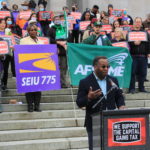Did you know? Letters to the editor are still one of the most read parts of newspapers.
Why now: Now is the time to ask legislators to keep moving Washington forward when it comes to tax fairness. When we ask the wealthy to pay what they truly owe, we can meet more of the needs in our communities like more housing, ample child care, and accessible health care.
TIPS FOR GETTING YOUR LETTER PUBLISHED
- Keep your letter to 100-200 words.
- If possible, include a reference to a recent article or commentary that’s connected to the issue of tax fairness or how we fund programs and services we depend on. Reach out to info@investwanow.org if you need help with this – we’re happy to help.
- Explain your connection to the topic. Are you a parent who wants fully funded schools? A patient who needs affordable health care? A neighbor who wants to see everyone in our community with a safe place to sleep? Share a personal experience or anecdote.
- Include a call to action. Tell people to visit a website to learn more, ask legislators to avoid funding cuts, or tell others in the community to join us.
KEY MESSAGES
WASHINGTON VOTERS WERE LOUD AND CLEAR
- When we defeated Initiative 2109, voters like us sent the message that we want the wealthy to pay what they owe in taxes
- As parents, teachers, business owners, and community members, we want to protect critical funding for child care, early learning, and education
- Legislators should keep working to find progressive revenue to avoid cuts to important programs like health care, housing, and education
WE WANT TO FIX OUR UNFAIR TAX CODE
- When the super-wealthy and corporations pay what they owe to support basic services and education, we can grow the wages of everyday Washingtonians and decrease our tax burden.
WASHINGTON’S UNFAIR TAX CODE HARMS BIPOC AND LOW-INCOME COMMUNITIES
- Our upside down tax code means poorer and BIPOC folks pay more than others do to fund public services, like schools, roads, health care, and more.
- Because of generations of discriminatory practices like red-lining, too many Black and brown people have been forced into lower-income, higher-tax tiers, which has prevented BIPOC communities from building and passing on generational wealth.

